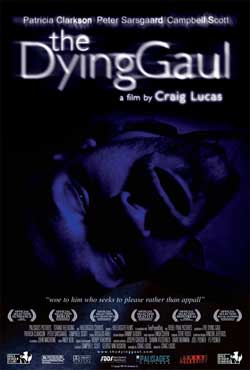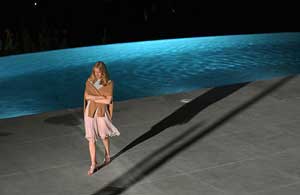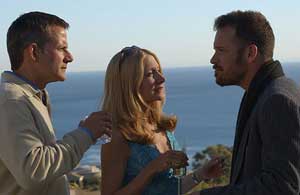 Craig Lucas’ The Dying Gaul sounds like another indie downer, but in reality it’s a tight and twisty thriller, filled with great characters and excellent actors. Based on the play also written by Lucas, it’s the story of Robert (Peter Sarsgaard), a screenwriter who needs to hit it big, since he’s dead broke. He has written a beautiful script called The Dying Gaul, based on the true story of his own lover’s death from AIDS. Jeffrey (Campbell Scott) is a studio executive who loves the script, and wants to buy it for a million dollars – if Robert changes one of the lovers to a woman. Elaine is Jeffrey’s wife, once a screenwriter herself, now a Hollywood power wife who finds Robert endlessly delightful and fascinating. It turns out Jeffrey does too, since he’s secretly bisexual. These three characters end up on a path that leads them to murder.
Craig Lucas’ The Dying Gaul sounds like another indie downer, but in reality it’s a tight and twisty thriller, filled with great characters and excellent actors. Based on the play also written by Lucas, it’s the story of Robert (Peter Sarsgaard), a screenwriter who needs to hit it big, since he’s dead broke. He has written a beautiful script called The Dying Gaul, based on the true story of his own lover’s death from AIDS. Jeffrey (Campbell Scott) is a studio executive who loves the script, and wants to buy it for a million dollars – if Robert changes one of the lovers to a woman. Elaine is Jeffrey’s wife, once a screenwriter herself, now a Hollywood power wife who finds Robert endlessly delightful and fascinating. It turns out Jeffrey does too, since he’s secretly bisexual. These three characters end up on a path that leads them to murder.
Patricia Clarkson plays Elaine. I had just talked to Clarkson at a press conference for Good Night, and Good Luck, but for The Dying Gaul I got her in a much more intimate setting at the Regency Hotel on Park Place. I transcribed a couple of Clarkson’s laughs, when they would help her tone come across better, but she laughed a lot. This is one positive, upbeat, good natured woman. A note – this interview was done before All the King’s Men was pushed back a year.
The Dying Gaul opens this weekend in New York and Los Angeles.
Q: You have so many movies coming out right now.
Clarkson: I shot all these movies a while ago. The last one I was shooting was All the King’s Men. This one I shot two years ago, The Dying Gaul. And then I shot – this year I did All the King’s Men and George Clooney’s movie, and one last episode of Six Feet Under. But I haven’t worked since June. I have been still and quiet since June.
Q: Craig said that you guys were circling each other for fifteen years.
Clarkson: I’ve known Craig through the New York theater forever. I actually saw this play twice and loved it. He approached me and said he was adapting it for film, and I got very excited. But he said it was going to be very different from the play, and I was happy about that because the play was quite indelible, the performances in that play. He said he was shifting it around and it was going to be a different energy.
I was at first overwhelmed and intimidated a little bit by this journey, but one ultimately I am really thrilled I took. I love Craig’s writing and I think it’s truly complicated. Many writers like to think they are, but they aren’t.
Q: What were the changes? Did you have any hand in defining your character for the movie version?
Clarkson: Yes, I did. There were some very specific things – I wanted Elaine to remain a very sexual, very physical creature. I said, if she’s going to be a Hollywood wife, let’s have her be a Hollywood wife. Let’s put the white bikini on. I’ll look good for it, let’s get it right. I know those women. Not well. But I’ve certainly been around the woman who has it all, so to speak. I wanted some specific things about the house, and I was glad that he brought in the reference that I used to be a screenwriter. You see that I used to write art films, that line, ‘I used to write the kind of films Jeffrey would never make.’ She has put a lot of her spirit and soul aside and entered – well, no one had a gun to her head so she chose to enter this world. And succumbed, unfortunately.
I wanted some specific things about the house, and I was glad that he brought in the reference that I used to be a screenwriter. You see that I used to write art films, that line, ‘I used to write the kind of films Jeffrey would never make.’ She has put a lot of her spirit and soul aside and entered – well, no one had a gun to her head so she chose to enter this world. And succumbed, unfortunately.
Q: It was equalizing that she was a screenwriter. It put all three characters on equal footing.
Clarkson: I think that’s exactly it. I think these characters are very equal – they’re good, bad and ugly. They’re all smart, they’re all making compromises, they’re all deeply conflicted about many things. That’s what I think one of the strengths of the film is, I think it’s three very equal characters.
Q: Is your character looking to seduce Robert?
Clarkson: No.
Q: Then why does she go hunt him down in the gay chat rooms?
Clarkson: I think she just likes him. Craig is very subtle, but if you pick up on what I say to him, what I whisper to him in the movie theater – ‘Don’t become one of them.’ And later she wants to read Robert’s script before Jeffrey makes the changes, and you see me lying on the bed crying.
I mean, I think she has a little bit of a crush on him but I think she is deeply empathetic. And that is why, when things turn, it is unbearable to her. She’s been so duped –it’s the loss of a friend, a lover, a husband.
Q: She sees herself changed in the same way that he’s changing Robert’s script.
Clarkson: I don’t think you can blame Jeffrey. Elaine is smart enough that she willingly changed. She decided to succumb to this life. She decided to give in at a certain point and be a mother and be a studio executive’s wife. But I don’t think Jeffrey has that kind of power – I think she changed herself.
But she’s very uneasy with it, so when someone like Robert comes into her life and she kind of sees these flickers of her past and he’s so delicious and so lovely…
Q: What was it like working with Peter and Campbell?
Clarkson: Dreamy. They’re incredibly gifted actors. There were brutal days on this shoot because it’s a very emotional piece at times, and it’s very intimate at times, so it was lovely to have the two of them to work with every day. It’s really a three hander film, so every single day I was either working with Campbell or Peter or both. On the days it was the three of us working it was… [laughs]. The more intense scenes are one on one, but the scenes with us together, like the party, were fun. It was joyous and easy, because Campbell and Peter have very similar qualities as actors. They’re quite effortless actors. Dammit! They get a lot of bang for their buck. They’re not capable of being false. They’re just seamless actors, and I think that’s a gift, not something you can be taught.
So yeah, they’re consummate actors.
Q: What’s tougher for you in a film like this, the emotional scenes or –
Clarkson: The bikini scenes? Getting on a bikini is not easy. But I must say I am naturally kind of thin, so I didn’t do a whole heck of a lot. I did a couple of sit ups!
But definitely these emotional scenes. I mean, if you look at the characters I’ve played – Pieces of April, The Station Agent, Far From Heaven – I’ve done a lot of emotional work. But something about the emotional scenes in this film, because there were so many shades of emotion within the scenes.
Q: Well there are also some fairly explicit sex scenes you have.
Clarkson: Those weren’t – Craig sets the right tone for those. It was a very easy set. I know Craig well, and I know Campbell. They weren’t as difficult. But you have to ask Peter and Campbell about their sex scene, how it was shooting that. I think they had great fun; I think they were laughing with each other.
But the whole tone, with those sex scenes, was Craig. Craig would sit on the bed with us and we’d be laughing and lying there naked.
Q: Was Craig naked as well? I know some directors do that.
Clarkson: No, he wasn’t! He asked if we wanted him to be naked and I said please no. Directors become very paternal to me. I just have this thing – I have never slept with a director I’ve worked with. They become paternal figures to me, or maternal figures. So yeah, I didn’t want Craig naked.
Q: This was Craig’s first time out as a director. What was it like to work with him? Did you help him out?
Clarkson: Of course I helped him at times. Campbell helped him, as did Peter. We helped him here and there. But he knew a lot about screenplays. He had a great DP in Bobby Bukowski. We had no money and no time, and this film looks beautiful.
So he had help here and there, but Craig knew exactly what he wanted. He was very specific about the tone, the take – sometimes he might make a different decision on where to keep the camera, but the thrust of the scene he always knew what he wanted.
We would help here and there and he would be open – great directors always are. It’s always in motion, it’s always shifting.
Q: Was he nervous?
Clarkson: Maybe a touch for the first day or two. It was very sweet, actually.
We got together the night before we started shooting in Malibu in this house where he and a bunch of people from the production were living and we did a read through. It’s interesting that you bring it up, because I think he was a little nervous. [laughs]
Q: This fall you’re in three films that have the scent of Oscar about them. Is that something you think about at all?
something you think about at all?
Clarkson: All the King’s Men I know is a big studio film, yes. But Good Night, And Good Luck – look, I hope that has a chance. David Strathairn and George and Grant Heslov are fantastic. But this film – no! I wasn’t thinking of gold.
I actually think it’s interesting that I have these two political films and in the midst this thriller.
Q: Is there anything coming up for you?
Clarkson: I’m doing this film called Learning to Drive with Naveen Andrews. Yummy. Just gorgeous and talented. They’re all I work with – Campbell Scott, Peter Sarsgaard, George Clooney. They have to be gorgeous and elegant or I don’t show up!
The movie is based on a New Yorker short story. It’s about a middle aged woman whose husband walks out on her. She’s a New York Times book critic and she doesn’t know how to drive. And she learns how to drive. In a nutshell. Maybe a few other things, too.